 Seitenverzeichnis
Seitenverzeichnis
 Site
map
Site
map
homepage Content

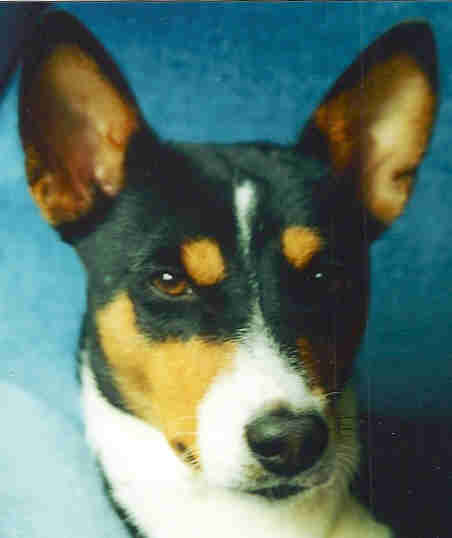
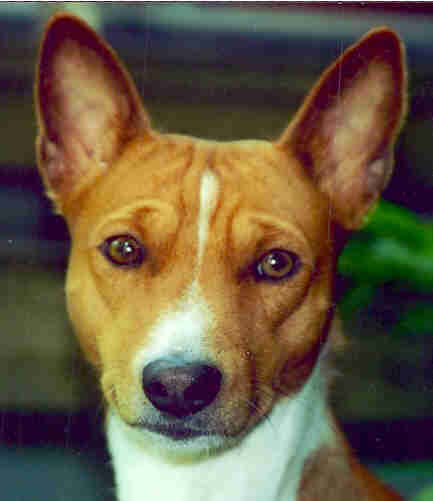
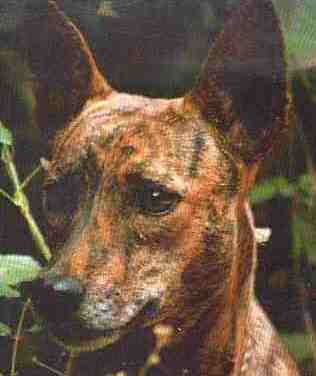

Partnership with Basenjis
First of all the puppy should be brought up in the Basenji-family with educating by the dogs parents, just as well by the Basenji Pack. This includes the puppies father. At a special age of the puppies, the Basenji father starts his training program. Meanwhile the Basenji mother is able to feed herself or to relax.
Sorry to say the appropriate Basenji breeding with training by the dogs parents being rare. How lamentable is the lack of loving dog raising! But I know that this is just wishful thinking.
Father and mother train their puppies Father Burundi is training his yodeling and curious puppies
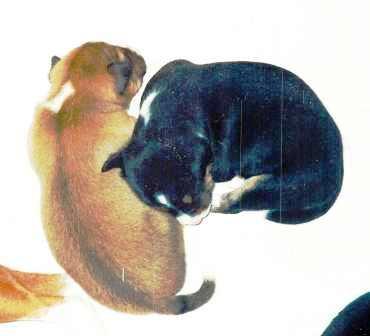
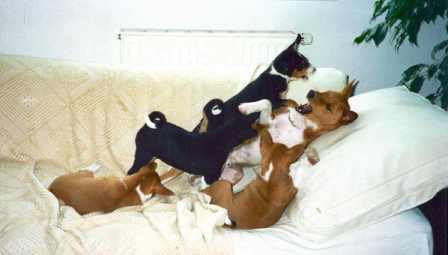
Dog-Mother Cocuri and Angori
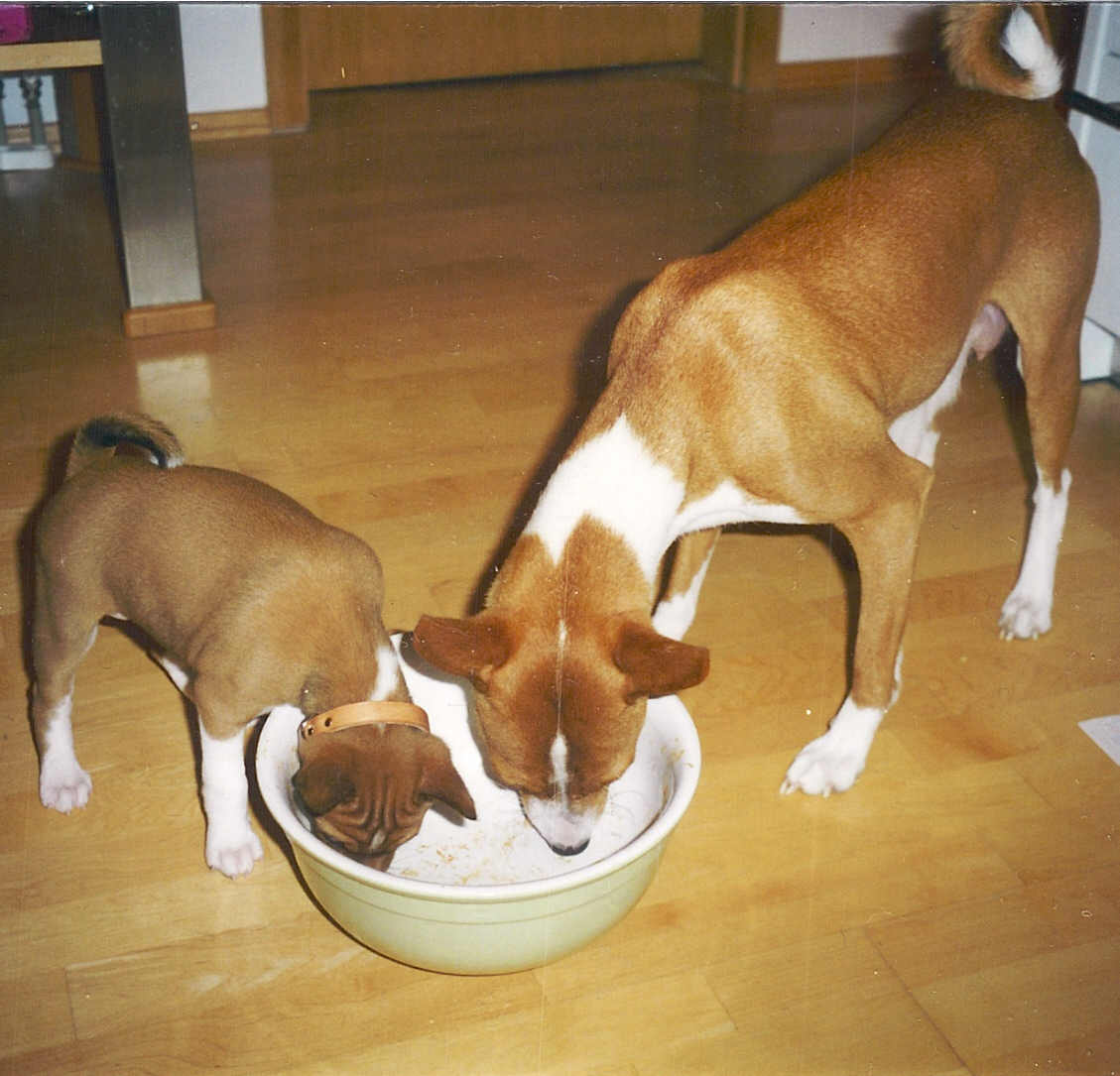
pictures courtesy Dagmar Wagner
Copyright ®
Dagmar Wagner
The Basenji Training of my puppies is continued very successfully by the guest Basenji Anubar.
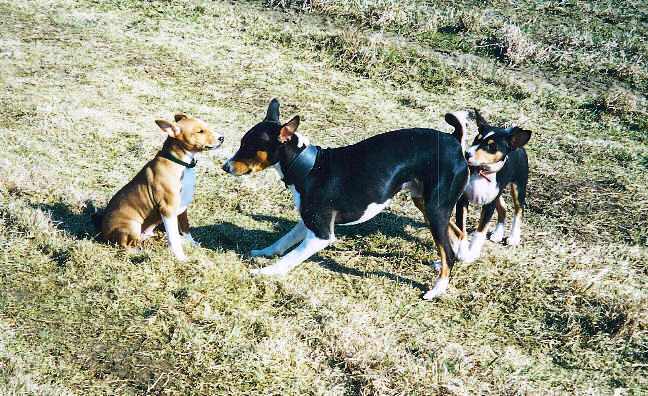
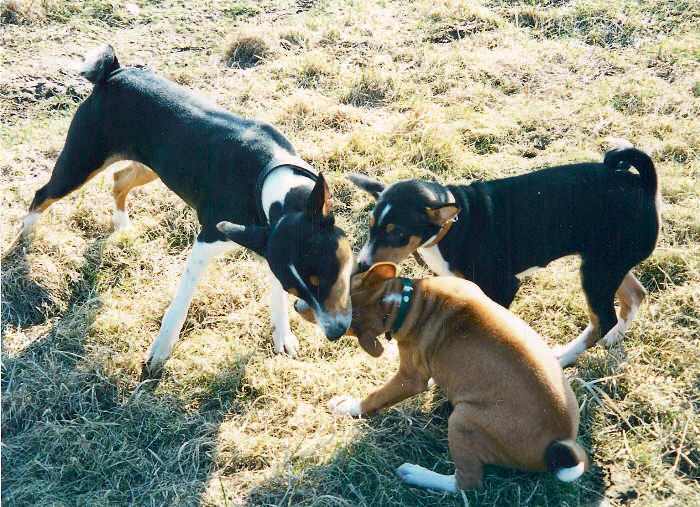
Surrogate Father Anubar with Angori and Azande
Give the puppy the chance to meet other dogs. This is the first socialization of the puppies and must be continued immediately at the beginning in their new home.
If you want to keep more than 1 Basenji , the development of a pack structure is quite possible. Anubar, new as the Basenji surrogate father, adopted Azande and Angori. After observing the young pups, its native or acquired rank in the pack should be considered. This role in the basenji pack is clear defined by nature .
Tips for the Upbringing of Basenjis
Any attempt to bring up basenjis requires much love and patience because the basenji can be educated only within limits. Why? Basenjis have lived for centuries in their African homeland and have independently done their hunting duties. Hunting duties had been their job to get prey. If one punishes them for that they hold a grudge because it was their job in Africa.
They decided for themselves what has to be done. From my many years of experience with basenjis I have learned that one should not try to drill them but to imprint a pecking order instead. The Basenjis cannot be forced to do something; they must be convinced because they understand immediately what we want. They obey very well, if it is be in their natural behavior. They consider and decide directly to follow the command, or not. If you are prepared to respect these characteristics of Basenjis, you and your Basenji become friends.
Please be considerate of his needs and remember that he is a dog, but be consequent in giving commands and their fulfilling.
The initial upbringing of basenjis in their native family is the main prerequisite for having dogs trues their race. Occasional attempts by the pup to change the pecking order are instantly stymied by the parents and siblings. Later on it is very important that the new owners maintain their authority as clearly as the canine parents. It is, however, not necessary to incessantly demonstrate the leadership position. The uppity dog gets reprimanded but not punished. Teach your Basenji without punishment what is not acceptable. If he understands you he will immediately react correctly.
Very important is the establishment of a daily routine, feeding at regular times and routine outdoor times. Set up a regime that you find necessary for living with your dogs for a long time – usually 12 to 18 years. Follow these rules yourself consequently. When clear and unmistakable rules exist for the dog and are consequently kept, the pup easily finds his place in the family and in the new pecking order including the owner. Be mindful of the ability of the pup to stay alone. Practice with him the being left alone.
Dogs need a structured everyday life with fixed times for activities because, like many other animals, they act habitually. That is of importance for the owner because basenjis like to play us tricks.
Waiting for a command at open doors is important, especially in a car, so that the basenji does not suddenly escape and rapidly is gone. Train him to return on command and on running freely without leash. Please be especially consequent at the beginning of your education of your pup. But do not act in an authoritarian manner.
Basenjis are active, attentive and reliably attached dogs. When we are in a good mood, so are they; the reverse also is true. Recognize his character so that understanding his character saves you much frustration later on.
Their instincts for their natural environment are well developed, but unfortunately not for our modern civilization. In our civilized world this can lead to damages (furniture) that do not please us or are dangerous (electrical cables). Watch your dogs especially the little pups.
They hear and see perfectly and have a well developed sense of smell. They quickly register a beneficial situation, such as to escape through an open car or house door or an open garden gate.
Here some examples of imprinting a pecking order. I strongly recommend giving a strict command of STAY whenever an open door looms. The Basenji has to wait till you put the dog on the lash. This is especially serious when opening car doors. Many dogs have died jumping out of cars into passing traffic. Basenjis do not recognize cars, trams or trains as a danger to them. Rather, they are pray to be hunted. Because of this hunting instinct basenjis have to be put on a leash near auto routes or in hunting areas. Do not rely on his obeying when let to run free.
Emphasize from the beginning of any free run training to make him return on command and not to stray too far to be out of command reach. A treat works wonders. The „glutton“ wins over the instinct for freedom. But to not overdo giving treats because you might train the dogs to be beggars. Use treats only with commands which absolutely have to be learned but are not obvious to the independent minded Basenji. A treat then is necessary.
I object to giving treats for every little instance of obedience. They obey me because they understand what I want of them, want to please me, and want to be praised. Their rewards are petting and loving words they want to hear.
Training aids
Training aids are useful to let the pup get accustomed to the new home everything is confusingly different for them. During this time of getting accustomed and familiar they learn the best and forever. Later on some habits may establish themselves that are difficult to correct. One usually sees much success in the early training of a basenji by a professional dog trainer who takes on individual dogs in private sessions. Only a few hours are usually needed. The trainers should be aware of the basenji behavior. There are many such schools around. The earlier you get there the better in order to prepare yourself and your dog for an increasingly complicated coexistence: encountering other dogs while on a leash or running freely. To get used to our modern times is necessary because the basenji does not display the usual total obedience.
The basenji is and should remain an individual because he was bred that way for centuries. He always will show his individualism and that should be tolerated because it is in his genes.
Train your Basenji playful , but don't expect an obedient "good dog". Please do not try to over-train a Basenji. Drilling does not fit into their nature. But for Basenjis as well the adage is true: exceptions confirm the rule. But those trained dogs make me unhappy. Such Basenjis for are a sad product of a wrong upbringing and Basenji-keeping.
Tasks and games for dogs can be learned in dog training classes. There the Basenjis also have an opportunity to meet other kinds of dogs and to learn the original ranking system . This way the pup can test his role in the pack.
It's my recommendation for all Basenji owners, to learn the basenji language that is composed of body signals and vocalizations. If you are prepared to learn the Basenji Language and to be able to communicate you'll get a pleased Basenji and one that makes you very happy.
Please don't forget the history of the Basenjis and their homeland in Africa, then you understand my concern to respect the Basenji Personality.
A new trend is non verbal education of the dog.
Observations concerning your position and that of the dog in the pack.
The Animal Learn Method animal-learn.de is the best for Basenjis; to teach without punishing corresponds to my view of education.